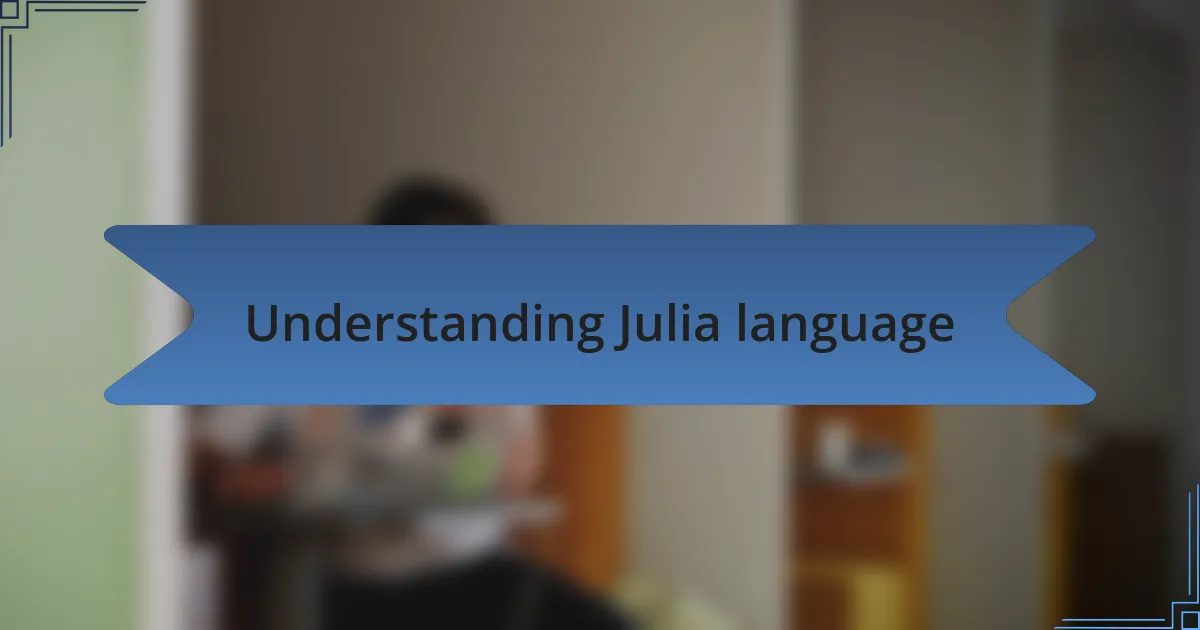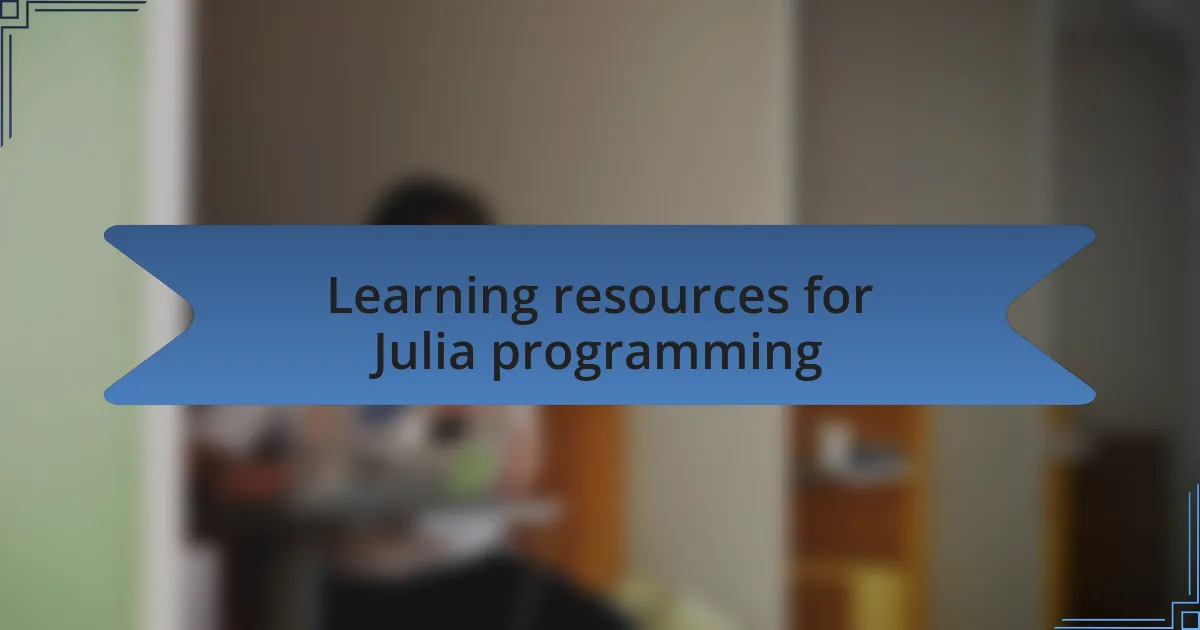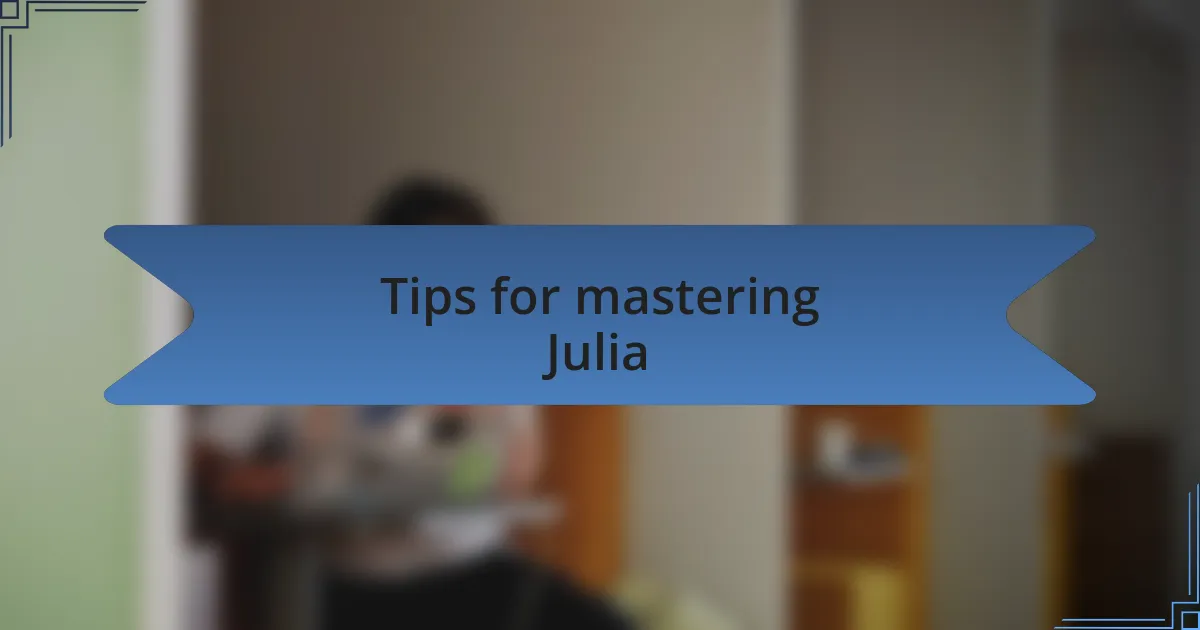Key takeaways:
- Julia combines high-level programming ease with low-level performance efficiency, enhancing the coding experience for data enthusiasts.
- Engaging with the Julia community and utilizing resources like JuliaLang.org and Julia Academy can greatly accelerate learning and understanding.
- Regular practice with small projects and embracing ‘just-in-time’ learning fosters deeper comprehension of Julia’s syntax and ecosystem.
- Contributing to community discussions reinforces knowledge and builds a network of support, highlighting the benefits of teaching others.

Understanding Julia language
When I first encountered Julia, I was struck by its elegant simplicity combined with powerful performance capabilities. This language effortlessly bridges the gap between high-level programming and low-level efficiency, which is something I deeply appreciate as a data enthusiast. Have you ever felt the frustration of a slow computation when you’re on the brink of a breakthrough? Julia helped me overcome that hurdle.
As I delved deeper into Julia’s syntax, I realized how intuitively it handles mathematical expressions. The way it simplifies complex algorithms into readable code truly offers a unique learning experience. I remember the excitement of writing a few lines of Julia code that executed significantly faster than my previous attempts in other languages. It’s that instant gratification that keeps me coming back for more.
But what really sets Julia apart is its commitment to community. Engaging with fellow learners and seasoned developers in forums and discussions has been incredibly rewarding. Have you ever wondered how collaborative environments can accelerate your learning? For me, being part of the Julia community not only honed my coding skills but also enriched my understanding of data science as a whole.

Learning resources for Julia programming
When it comes to learning resources for Julia programming, I found myself drawn to online platforms that cater specifically to this vibrant language. Websites like JuliaLang.org are treasure troves; they offer comprehensive documentation and tutorials that truly demystify the learning process. I recall spending hours poring over the Getting Started guide, and it felt as though each step I took opened a new door to understanding.
Another fantastic resource I stumbled upon was the Julia Academy. It’s not just the structured courses but also the interactive coding environment that captured my attention. The first time I completed a Julia course and executed my first machine learning model, I felt a surge of accomplishment. Have you experienced that moment where everything just clicks? It’s exhilarating, and it’s that kind of learning environment that makes the journey worthwhile.
Don’t overlook the power of community-driven platforms like GitHub and Stack Overflow. I often find myself browsing Julia repositories not only to understand how others approach problems but also to appreciate the creativity in their solutions. Engaging with real code and seeing the various ways people implement algorithms has enriched my understanding of programming as a whole. Have you ever learned more from peers than from textbooks? In my case, diving into collaborative projects sparked new ideas and challenged my coding skills in unexpected ways.

Tips for mastering Julia
Mastering Julia can sometimes feel overwhelming, but one effective strategy I’ve found is to practice regularly with small projects. Each time I set a specific goal, like manipulating a dataset or creating a simple plot, I gain a clearer grasp of the syntax. Do you remember the first time you tackled a personal project? That sense of ownership can amplify your learning experience.
Another tip? Embrace the concept of ‘just-in-time’ learning. I recall working on a data visualization task when I stumbled upon a function that seemed foreign at first. Instead of getting frustrated, I took the time to investigate it. As I worked through the documentation and examples, I not only learned the function but also deepened my overall comprehension of Julia’s ecosystem. Isn’t it fascinating how a single moment of curiosity can lead to a deeper understanding?
Lastly, actively contribute to forums or community efforts related to Julia. Whether it’s answering someone’s question or participating in discussions, sharing your insights will reinforce your knowledge. I remember when I first helped a beginner troubleshoot their code; it deepened my own understanding more than I anticipated. Have you ever noticed that teaching is often the best way to learn? Connecting with others not only solidifies your skills but also builds a network of support as you navigate the complexities of Julia together.